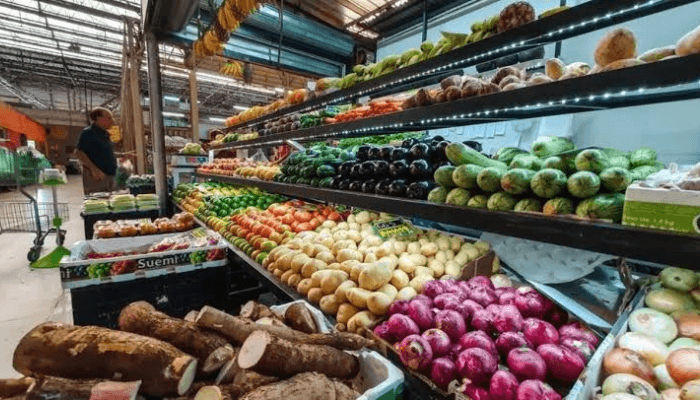…Yields lowest among peers
Nigeria may continue to see crop losses except it fixes the inadequate storage infrastructure, which puts food security under serious threat.
Inadequate storage facilities and poor transportation networks hinder the efficient distribution of food products, leading to spoilage, increased costs, and reduced access to nutritious food, according to experts.
According to them, developing the country’s agricultural sector entails establishing key infrastructure enablers that help boost farm productivity.
Prince Samuel Joseph Samuel, executive chairman of Origin Group, explained that Nigeria’s agriculture is plagued by weak linkages that cause huge food losses.
“Infrastructure, especially the cold chain, is underdeveloped or non-existent,” he said, attributing it to the immense food wastage in the country.
Read also: Lagos, Netherlands unveil off-grid cooling solution to improve food, pharmaceutical storage
Samuel said that there is a need to develop every aspect of storage and cold chain infrastructure to drive the country’s food security.
Nigeria’s agricultural sector productivity has been affected by the immense food waste, primarily attributed to inadequate storage facilities, limited access to modern preservation technologies, and inadequate road networks.
Many roads are impassable in Africa’s most populous country after a few days of heavy rainfall, cutting off some farming communities completely from being accessed.
Even when commuters and farmers offer to pay higher fares, many commercial motorists refuse to go to such communities for fear that their vehicles will sink.
Nigeria’s core stock infrastructure is estimated at 30 percent of gross domestic product (GDP), according to the International Trade Office of the U.S. Department of Commerce. The figure falls short of the international benchmark of 70 percent for middle-income countries set by the World Bank.
This infrastructure deficit not only exacerbates food insecurity, particularly in rural areas where the majority of Nigeria’s food is produced. It also severely impacts the livelihoods of countless farmers and the broader economy.
“Adequate storage facilities are a big change to our food security because it is a very critical infrastructure needed to support food production and distribution,” AfricanFarmer Mogaji, project manager team lead at AfricanFarmer Hub.
Read also: Ekiti sets up storage facilities for bumper harvest, food security
The low rate of Nigerian agricultural productivity is also caused by climate change, low levels of technology, and insecurity.
Nigeria produces approximately 55 million metric tonnes of food annually, but about 40 percent is lost due to financing gaps, poor logistics limiting cold chain infrastructure, according to the Organisation for Technology Advancement of Cold Chain in West Africa (OTACCWA). The nation loses N3.5 trillion annually to post-harvest losses.
Low farm yields
Despite growing concerns over the country’s food insecurity and rising imports, Nigeria’s farm yield per hectare has remained poor and one of the lowest among its African peers.
“We currently cannot produce the food we need to feed 200 million people because our yield per hectare is still low and issues limiting productivity are yet to be addressed,” said Ibrahim Kabiru, president of the All Farmers Association of Nigeria (AFAN).
“Infrastructures such as adequate storage are still grossly lacking and the roads to most farming communities are in poor condition and impassable for some,” Kabiru said.
Data from the Food and Agriculture Organisation (FAO) show that Nigeria has the lowest average yield per hectare of five selected crops among its African peers, including Egypt, Kenya, South Africa, and Ethiopia.
For tomatoes, the average yield per hectare in Nigeria is 3.5 metric tons (MT); Kenya’s average yield for the crop is 18.7 MT; Ethiopia’s tomato yield is 4.9 MT; Egypt is 8.7 MT, and South Africa’s average yield for the crop is 65.6 MT.
Nigeria’s average yield per hectare is 1.9MT, while Kenya’s and South Africa’s are 6.4MT and 1.8 MT, respectively. Ethiopia and Egypt have 3.9MT and 7.5MT average farm yield per hectare, respectively.
Read also: How five cold chain entrepreneurs are saving Nigeria’s fresh food markets
“The impact of inadequate storage facilities starts directly from the farm,” said Mogaji, noting that quality seeds not adequately stored before planting reduce the yield per hectare.
“You must store your seeds properly even before planting, and if that is not done properly, it affects the productivity of the crop,” he explained.
“Some seeds need a certain temperature for storage, but these facilities are lacking on most farms, especially smallholders. And this, in turn, impacts productivity and yield per hectare,” he added.
According to him, weak infrastructure not only leads to rising post-harvest losses but also low farm yields.

